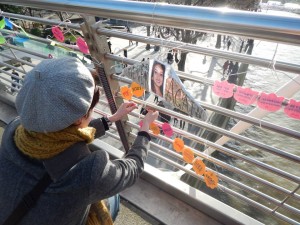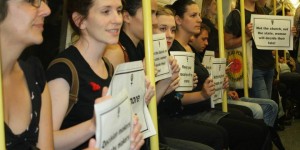Interview: Protesting Spanish abortion law in London
Interview with Cristina Rios and Mireia Gargallo
Whilst Cristina and Mireia are both Spanish immigrants living in London, and are both political activists working in the My Belly is Mine campaign, and indeed are good friends – the two, in many ways, come from very different places.
Mireia came to London six months ago looking for work, escaping record levels of youth unemployment in Barcelona. Cristina, whose mother is Scottish and father Spanish, grew up in Spain but settled in Britain eighteen years ago.
Mireia describes herself as “a socialist and a trade unionist” who had little experience of feminist campaigning – whereas when Cristina wanted to respond to the threats to abortion rights in Spain her first port of call were the feminist organisations that she knew.
Together they are involved in My Belly Is Mine, a campaign group, set up to counter new threats to abortion rights in Spain. Cristina explains “It all started on 20th December last year when the Justice Minister [Alberto Ruiz-Gallardón] put forward a draft bill which suggested banning abortion – it was very extreme.”
She says Gallardón “has an obsession with abortion and has said that “I’m trying to continue the work of my father” (who tried to stop the 1985 abortion reforms) to “protect the unborn child”. The Ambassador here in London was a young MP in the 80s and assisted Gallardón’s father as part of that clique. “They want to take us back to the 70’s.”
Mireia points out that there is this “milieu of extreme Catholic groups, ultra Catholic pressure groups pushing to have this kind of thing, they do demonstrations at abortion clinics” and are connected to groups like Opus Dei. She’s quick to point out her mother is Catholic and that she’s talking about politically “right-wing organisations” rather than simply religious ones. After all the majority of Spanish people, even the Catholics, are pro-choice.
Cristina recalls “I was in Glasgow celebrating Christmas, checking the news and I blew a fuse! I was so impressed by how the French feminists turned out on the streets so quickly, so I set up the twitter account @mybellyismine”, which is a direct translation of the Spanish twitter hash tag #mibimboesmio, “which Spanish feminists were using to build the protests on twitter.”
When she got back to London “I went to the London Feminist Network and met a couple of people there who have became part of the campaign from the very start”.
The first protest at the Spanish Embassy was called on January 9th by the British based national campaign Abortion Rights and both Cristina and Mireia were there. Cristina says “from there we decided to do our own stuff, as Abortion Rights is focused on Britain so the support they could give this particular issue was limited.”
On 9th Febuary there were national protests in Spain and the campaign called a picket of the embassy to coincide with this. The campaigners tried to hand in a box full of coat hangers but “they wouldn’t open the door, they said they were closed –but they so weren’t!”
 Later, on International Women’s Day there was a hanger making workshop which got in members of the public and the campaign tied them to the Hungerford Bridge (right). The campaign has been characterised by new approaches to getting the message out including crafts and being pictured in iconic London settings, like the tube (picture below and video).
Later, on International Women’s Day there was a hanger making workshop which got in members of the public and the campaign tied them to the Hungerford Bridge (right). The campaign has been characterised by new approaches to getting the message out including crafts and being pictured in iconic London settings, like the tube (picture below and video).
A group who do education on social issues were holding an art exhibition and “they wanted us to contribute some hangers, which is where I met Mireia.”
From there they’ve built a range of contacts in London’s political Spanish community, as well as contacts in France and Berlin. They have combined forces with the Spanish Women’s Assembly, which is part of the 15M movement as well as making connections with the Irish community who, through “Speaking of Imelda” set up support groups helping Irish women come to England for abortions. Historically England became the legal destination of choice for abortions and “some of those who’d been involved in the 80’s have participated in our recent actions.”
Mireia says “Now there’s Podemos, the political party, in London. We can do more together. At the last Assembly of Podemos they knew the name of the campaign and they want to do more.”
Politics as a migrant
We begin talking about the politics of migrant communities and Mireia says “I was looking for things to do in London. I’ve never really been involved in feminist politics, I’ve only really been involved in trade unionism and wanted to improve my knowledge of feminist struggles and those kinds of things – also focusing on migrant struggles. I didn’t understand how vulnerable you are as an immigrant.”
“You don’t even know where to buy food, moving around the city, you can’t manage the language. I’m in a much, much better position than some of the people I know, like the Latin American cleaners. People who come here, in the early days, they have so many problems it’s difficult to get involved in politics. The people who are already left-wing know what’s going on though.”
Mireia thinks it’s different for the Spanish in London who don’t form a coherent community. “It’s not like the Kurdish, they have their communities, social centres. In the beginning [Spanish migrants] were people who were extra educated, PhDs, qualified, they didn’t need to be here in a way. Now there are people coming over , they are desperate , they have been out of work for years, they speak a little bit of English, so they don’t know what to do.”
 For Mireia getting involved with My Belly is Mine was one way to become more politically involved. “I went to the embassy several times and joined the protests, I also have contacts in the Spanish state who are in touch with feminist groups about abortion rights. It is important because the women I know who need abortions, they cannot come here. It’s a human right and they are trying to abolish it.”
For Mireia getting involved with My Belly is Mine was one way to become more politically involved. “I went to the embassy several times and joined the protests, I also have contacts in the Spanish state who are in touch with feminist groups about abortion rights. It is important because the women I know who need abortions, they cannot come here. It’s a human right and they are trying to abolish it.”
Cristina says “We can’t allow this situation, so many NGO’s oppose this, Human Rights Watch, Amnesty International and international organisations have condemned this bill.”
It could become the law in just two months that doctors who perform abortions will be criminalised (rather than the women) apart from a very few exceptional circumstances.
The pair surprise me when I ask what they expect to happen and they are both expecting the law to get passed. In fact Cristina is already involved in planning and setting up support groups to get women safe abortions should the legislation pass. “London is the historical destination for women seeking abortions.”
Cristina says “Rich women can always afford to get an abortion”, and Miriea echoes “Yes, it’s part of the economic struggle as well.” She grins “I know I’m a little bit old fashioned, a little bit workerist, it’s about protecting the rights of the most vulnerable part of the working class, women.“
The international connections are helping them make a splash (or “feed the flame” as Mireia puts it). Cristina says “I’m hopeful the impact is growing it’s paying off. We were interviewed by the Wall Street Journal and Paul Mason did a report on the issue with our help, I’m hoping we can follow up on this.”
However keeping people informed is not always easy. “The blog is hard work – the British press aren’t interested in Spanish law so I follow the Spanish press and [pass it on] so people can follow developments.”
The support network is definitely growing. “International groups are following what we are doing, and retweeting our stuff. The Spanish Women’s Assembly have been in contact with [international groups] a lot, but really we’re just working together and we get more attention now we’ve joined forces with the Assembly.”
Just as Mireia and Cristina, who became politically active in different traditions, are finding strength in working together, the campaign itself is gathering strength from drawing on a community of like minded activists and a variety of organisations from different countries as well as different political perspectives. If a substantially pro-choice country can threaten to take away long established rights it’s a warning to us all that we cannot assume hard won victories will last forever unless we act to keep them won.
My Belly is Mine
https://twitter.com/mybellyismine
https://www.facebook.com/mybellyismine
http://www.tumblr.com/blog/mybellyismine
http://mybellyismine.wordpress.com/




July 14, 2014 - 2:06 pm
So this protest is called “My Belly is Mine”, how about concentrating on CONTRACEPTION instead of the killing unborn babies instead?? My parents did NOT want me (they were against abortion) and yes it was a horrible childhood, so you would prefer my mother had aborted me?!!
I find anyone who thinks that “women should choose” TOTALLY disregards the male population’s choice, I’m 100% for equality & this is NOT equality!
July 15, 2014 - 7:46 pm
People have a right to say what happens to their own bodies. Until men start getting pregnant it’s not their choice to make. It’s the person who is carrying the pregnancy’s decision and no one else’s.
The ironic thing is the ultra-Catholic right, who are trying to make abortion illegal, are *also* opposed to contraception, while feminists and the left have been consistent advocates of sex education, contraception, etc. If you want to find people promoting birth control… look left.